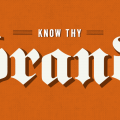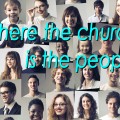 Today’s American society has many similarities to the culture which surrounded the first century church:
Today’s American society has many similarities to the culture which surrounded the first century church:
- People are spiritually sensitive and hungry but they are not looking to the Christian church.
- The culture is pluralistic but intolerant of the exclusive claims of Christ.
- The Christian faith is politically maligned and culturally held in disdain.
That first century culture was God’s incubator for the genesis of the Church. We know the sect of Christ followers grew rapidly. The Church multiplied at an unparalleled rate and its influence resulted in transformed communities and shifted culture as it spread. They were world changers in their first generation and that is the model that God has recorded for us in the book of Acts.
But before getting started on this topic it is probably important to define what I mean by the word “missional.” It is simply an adjective that describes something that is characterized by mission.
“Fundamentally, our mission (if it is biblically informed and validated) means our committed participation as God’s people, at God’s invitation and command, in God’s own mission within the history of God’s world for the redemption of God’s creation.” (The Mission of God, by Christopher Wright)
1. The Missional Church
The Church is Missional by Nature
- The church is the Body of Christ and Christ is the Head.
- He is a missionary God, actively involved in His redemptive mission to His creation.
- Therefore, if we are His Body then we are also by (His) nature missional.
The Church is Missional by Command – Great Commission
“But you will receive power when the Holy Spirit comes on you; and you will be my witnesses in Jerusalem, and in all Judea and Samaria, and to the ends of the earth” (Acts 1:8, NIV).
A missional church is a Kingdom building church.
A reproducing community of disciples living authentic lives as ambassadors for Christ proclaiming the gospel and transforming their world.
2. A Kingdom building church does not have a program for missions; rather, missions is part of who they are, their DNA.
Now those who had been scattered by the persecution in connection with Stephen traveled as far as Phoenicia, Cyprus and Antioch, telling the message only to Jews. Some of them, however, men from Cyprus and Cyrene, went to Antioch and began to speak to Greeks also, telling them the good news about the Lord Jesus. The Lord’s hand was with them, and a great number of people believed and turned to the Lord.
News of this reached the ears of the church at Jerusalem, and they sent Barnabas to Antioch. When he arrived and saw the evidence of the grace of God, he was glad and encouraged them all to remain true to the Lord with all their hearts. He was a good man, full of the Holy Spirit and faith, and a great number of people were brought to the Lord.
Then Barnabas went to Tarsus to look for Saul, and when he found him, he brought him to Antioch. Sofor a whole year Barnabas and Saul met with the church and taught great numbers of people. The disciples were called Christians first at Antioch.
During this time some prophets came down from Jerusalem to Antioch. One of them, named Agabus, stood up and through the Spirit predicted that a severe famine would spread over the entire Roman world. (This happened during the reign of Claudius.) The disciples, each according to his ability, decided to pro- vide help for the brothers living in Judea. This they did, sending their gift to the elders by Barnabas and Saul” (Acts 11:19-30 NIV).
- They are People-Focused (19-20)
- Christ-Centered (21b)
- Spirit-Empowered (21a)
- Grace-Conscious (23)
- Well-Known (26c)
- Financially-Generous (29-30)
3. A Kingdom building church is not satisfied to just support; they emphasize engagement. Acts 13:1-3 (NIV)
In the church at Antioch there were prophets and teachers: Barnabas, Simeon called Niger, Lucius of Cyrene, Manaen (who had been brought up with Herod the tetrarch) and Saul. While they were worshiping the Lord and fasting, the Holy Spirit said, “Set apart for me Barnabas and Saul for the work to which I have called them.” So after they had fasted and prayed, they placed their hands on them and sent them off.
- They Selected Their Best
- They Set Apart Their Best
- They Sent Their Best
These five leaders from the church at Antioch started nine churches and literally changed the world. It is worth noting that these five men were distinctly different. They came from diverse backgrounds of education, training, ethnicity, experience, economic status, religious heritage, and lifestyles.
God uses all kinds of people to reach all kinds of people as He builds His kingdom.
4. A Kingdom building church is not content to maintain; they must multiply.
They preached the good news in that city and won a large number of disciples. Then they returned to Lystra, Iconium and Antioch, strengthening the disciples and encouraging them to remain true to the faith. “We must go through many hardships to enter the kingdom of God,” they said. Paul and Barnabas appointed elders for them in each church and, with prayer and fasting, committed them to the Lord, in whom they had put their trust” (Acts 14:21-23 NIV).
Paul and Barnabas passed along to these church planters what was given to them at Antioch. They led them to do four things (21-22):
- Count the cost
- They strengthened them through discipleship
- They encouraged them to be faithful
- They reminded them that church planting is hard work
We are not going to expand the Kingdom apart from starting new churches as demonstrated in this account of the first century church.
- Confirmed and appointed the leaders (23a)
- Commissioned by the church (23b) as they had been commissioned in Antioch
- Commended them to the Lord (23c)




0 Comments